
Celebrating Waterloo’s finest graduates
Star PhD graduates recount and reflect on their academic journeys

Star PhD graduates recount and reflect on their academic journeys
By Victoria Lumax University RelationsConvocation is an exciting time of year, where students reach the long-awaited day when they can celebrate their hard work and achievements together with peers. The University of Waterloo takes pride in recognizing such achievement.
It is a substantial and distinguished honour to be awarded a doctorate, becoming an expert in a field of the graduate’s choosing. Six outstanding new PhD graduates as of fall 2021 have been chosen to share about their academic journeys — how they got here, what they did here, and where they are going. Read their stories:
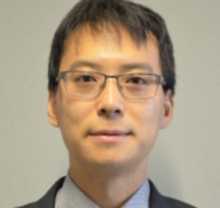
Victor Wang
“All these convinced me that Waterloo was where I would belong.”
In the field of accounting, the risk is a real and important factor to consider and communicate to stakeholders. In his research, Wang studied public companies' qualitative risk disclosures using natural language processing (NLP) techniques and tried to understand the factors underlying disclosure decisions. After analyzing two billion words worth of reports, he found that managers tend to provide more disclosures when they report less conservatively. Wang’s work brings important clarity and insight to a critical practice in his discipline.
Pursuing a PhD is a very demanding process, and Wang acknowledges that there are many setbacks that make you question your decisions and give you the feeling that you may not be able to pull through. He offers to other doctoral students the advice to seek help at hard times like these, help from faculty members, fellow students and friends.
Wang is soon starting a tenure-track position as assistant professor of accounting at California State University, Long Beach, and is excited to give back to academia.
“It’s the caring faculty at Waterloo who helped me fulfill my dream,” says Wang. “Many students at CSULB are first generation students like myself, and I understand their unique challenges. I want to pay this forward by helping my own students achieve their full potential.”
Wang wants to thank the faculty, fellow students, and many others at Waterloo for making his past five years an enjoyable and fulfilling experience.
“I’m always grateful to the University of Waterloo, and I’m forever a proud Waterloo graduate.”
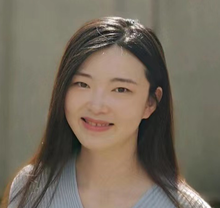
Mushu Li
Li’s research as a PhD student focused on resource management for wireless networks. She worked with advanced techniques, such as artificial intelligence and optimization methods, to maximize the capacity of wireless networks. This way, the networks could support and apply diversified services to more mobile users with a higher data rate.
Li’s supervisor provided her with numerous supports throughout her doctorate, challenging her to think in new ways.
“I feel that I always have hope in every challenge I face, despite everyone's PhD journey being challenging,” says Li. “My supervisor always told us to read more literature, think more about the research topic, and talk more with colleagues to open our minds. I benefited greatly from many meaningful discussions and critical thinking when I studied for my degree.”
Many fond memories will stick with Li after graduation, including receiving an NSERC Canada graduate scholarship, passing her thesis defense, and the numerous research (and fun) conversations she had with Professor Sherman Shen, her supervisor, and members of the Broadband Communications Research (BBCR) lab. Li is very thankful to her supervisor, as well as professor Weihua Zhuang for their “continuous support, patient guidance, and endless help” during her PhD.
Currently, Li is a postdoctoral fellow at the University of Waterloo, continuing to provide insight and leadership in the world of Engineering research.
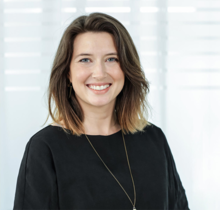
Phoebe Stephens
Phoebe Stephens knew she had to pursue her PhD in Social and Ecological Sustainability at Waterloo because she wanted to continue to work closely with her master’s supervisor, Dr. Jennifer Clapp: an internationally recognized scholar of the political economy of food. Drawn in also by the School of Environment, Resources and Sustainability’s (SERS) transdisciplinary scholarship, pursuing her doctorate at Waterloo was an easy decision.
Stephens’ PhD research explores the role of finance in supporting transitions towards more sustainable food systems. More specifically, it considers the role of responsible “impact investing” in bringing about positive social and environmental changes in our food systems.
Stephens has so many fond memories as a Waterloo student she claims it’s impossible to choose just one. Although she thinks this might sound odd, preparing for her comprehensive exam is an experience she holds dear.
“I felt incredibly supported by my peers — upper year PhDs shared their experiences and helped me navigate the process,” says Stephens. “I was given ample time to read widely about a topic that I love, and I felt challenged in a way that I never had before.”
For other students pursuing their PhDs, three pieces of advice come to mind for Stephens:
“Firstly, come up with a structure that works for you and allows you to make consistent progress,” says Stephens. “I was first introduced to the pomodoro method during my PhD orientation and used it constantly throughout the PhD. Secondly, believe in yourself and don’t let imposter syndrome get to you. Finally, don’t take yourself too seriously and enjoy the process.”
A SSHRC funded postdoc at the University of Toronto is what’s up next for Stephens. Departing from Waterloo, she says she will miss the people the most. The least? Paying the tuition.
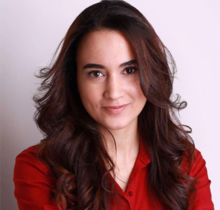
Stephanie Aboueid
“Technology is all around us and digital platforms such as symptom checkers have become more pervasive in recent years,” says Aboueid. “Though, the availability of technology does not necessarily mean that individuals will adopt and use it.”
What advice would Aboueid give to other PhD students? Believe in yourself and your research.
“If you are passionate about a topic, pursue it,” says Aboueid. “Completing a PhD is a huge accomplishment and an opportunity to develop and apply unique skills. Jot down the skills you want to develop and make sure that your research will allow you to develop these skills.”
Aboueid sends sincere thanks to her supervisor, professor Ashok Chaurasia, for his continuous support and encouragement throughout her studies. She also sends thanks to her friends Huda, Teeyaa and Shreya.
Currently, Aboueid is an expat in Saudi Arabia working for KPMG in Investment Attraction across various sectors, including healthcare. Here, she conducts additional analyses on collected data to continuously contribute to the research field.
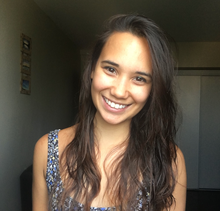
Cheryl Sturm
“After researching and learning about all the facilities and the reputation the university had it was pretty clear … Waterloo or Bust!”
Sturm’s dissertation involved studying thermoelectric materials, specifically those which are composed of cheap and non-toxic elements. These materials can convert heat into electricity, which is useful in creating sensors for the Internet of Things (IoT): the network of physical devices connected to the internet, collecting and sharing data.
“Current high performance thermoelectric materials are composed of toxic elements, but we don’t think too much of it because they are mostly being used to power the Mars rovers and deep space satellites. But, for example, there are patches used to test your blood sugar that need to be recharged every so often, but if you implement a thermoelectric device, it would take away the need for a battery since it would be powered by your body heat!”
The Chemistry graduate student intramural softball team, “Acids and Bases,” gave Sturm a lot of fond memories. The team was a nice reminder to Sturm that she wasn’t alone, and that other students were experiencing the same issues and feelings as she was. No matter how the game was going, the team would always be sure to have “FlourineUraniumNitrogen!”
“I’ve met so many wonderful people, formed strong friendships, and even participated in activities I would have never even thought of doing!”
What’s next for Sturm? After not seeing family for a while due to the COVID-19 pandemic, she’ll be spending time with loved ones and taking a mental health break before making the leap into the industry.
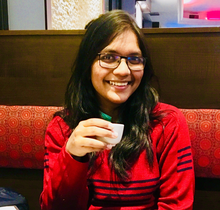
Ragini Singhal
“I feel so fortunate to be part of this wonderful community at UWaterloo,” says Singhal. “Being an international female PhD student had its own challenges but the support I got here made it much easier.”
Waterloo has always been on the top of Singhal’s list when applying for graduate schools. She had acquaintances who were Waterloo graduates, and from them, she got the sense that this university could provide her with the educational support she was looking for.
Singhal’s dissertation research focuses on a special type of mathematical objects known as G2-manifolds. Her work focuses on deformation theory of nearly G2 structures and nearly G2 instantons; in other words, determining how to distort G2 structures to obtain new ones.
“These are 7-dimensional objects which are immensely useful in mathematics and physics,” says Singhal. “Their study has opened doors to so many interesting theories.”
If she could give one piece of advice to other PhD students, it would be to never underestimate yourself and ask for help whenever required.
Some of Singhal’s fondest memories were made at the Grad House with fellow grad students, as well as being a part of the team for “The Great Polytope Barn Raising” project, led by one of her supervisors.
Singhal is most grateful for the overwhelming support of her PhD supervisors: Professor Spiro Karigiannis and professor Benoit Charbonneau. Singhal is least grateful for the geese attacks in front of Ira Needles Hall.
Next for Singhal is a Simon's collaboration Postdoctoral fellowship at King's College London, working with professor Simon Salamon.

Read more
Six exceptional graduates talk about the ups and downs of earning their doctoral degrees

Read more
Earning the highest academic status there is, six exceptional PhD students graduate this spring

Read more
Waterloo secures #1 spot for innovation in Maclean's 2022 ranking
The University of Waterloo acknowledges that much of our work takes place on the traditional territory of the Neutral, Anishinaabeg, and Haudenosaunee peoples. Our main campus is situated on the Haldimand Tract, the land granted to the Six Nations that includes six miles on each side of the Grand River. Our active work toward reconciliation takes place across our campuses through research, learning, teaching, and community building, and is co-ordinated within the Office of Indigenous Relations.